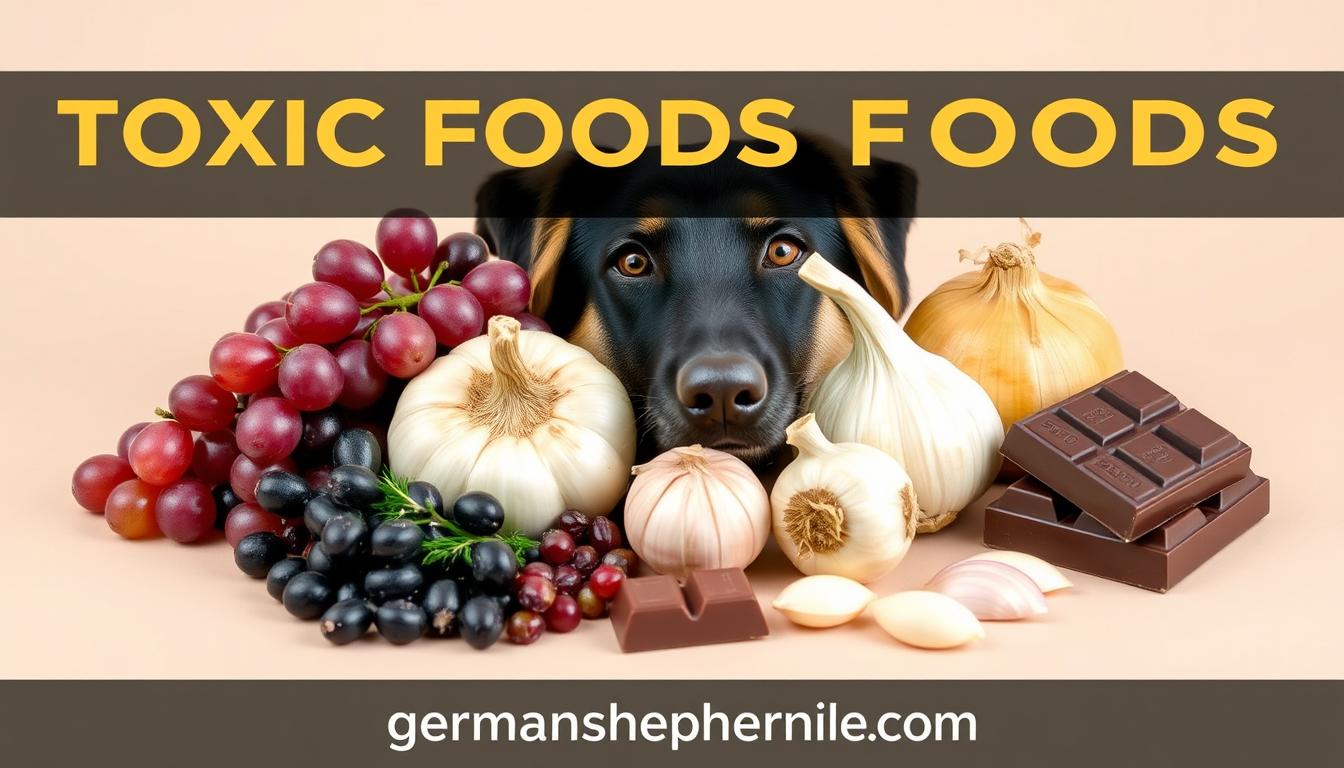As a German Shepherd owner, it’s crucial to be aware of the toxic foods that can harm your pet. While it might be tempting to share your food with your furry friend, some human foods can be detrimental to their health.
A dog’s diet plays a significant role in their overall well-being, and canine nutrition is vital to maintaining their health. Certain foods can cause harm, ranging from mild discomfort to life-threatening conditions.
Key Takeaways
- Some human foods are toxic to German Shepherds.
- A balanced diet is crucial for their health.
- Avoid feeding your German Shepherd harmful foods.
- Be aware of the risks associated with certain foods.
- Keep toxic foods out of your pet’s reach.
Understanding Your German Shepherd’s Unique Digestive System
As a German Shepherd owner, it’s crucial to understand the intricacies of your dog’s digestive system to ensure their overall health and well-being. German Shepherds are known for their loyalty and intelligence, but their digestive system can be quite sensitive.
German Shepherd Digestive Sensitivities
German Shepherds are prone to various digestive issues due to their breed-specific characteristics. Their digestive system is sensitive to certain foods, which can lead to discomfort, allergies, or more severe health problems. It’s essential to be aware of these sensitivities to provide the best care.
Why GSDs React Differently to Certain Foods
The reaction of German Shepherds to certain foods can vary significantly due to their unique genetic makeup and individual sensitivities. Factors such as food allergies, intolerances, and the quality of ingredients in their diet play a crucial role in how they respond to different foods.
Breed-Specific Dietary Considerations
When it comes to feeding your German Shepherd, there are specific dietary considerations to keep in mind. Their diet should be tailored to their age, size, and activity level. Moreover, being mindful of breed-specific dietary considerations can help prevent common digestive issues.
By understanding these aspects, you can make informed decisions about your German Shepherd’s nutrition, ensuring they lead a healthy and happy life.
1. Foods That German Shepherds Should Avoid
Certain foods that are safe for humans can be detrimental to German Shepherds, and it’s essential to identify them. As a responsible pet owner, understanding the risks associated with specific foods can help you protect your German Shepherd from potential harm.

The Danger Scale: Mild to Severe Toxicity
The toxicity of certain foods can range from mild to severe, and it’s crucial to understand this spectrum to keep your German Shepherd safe. Some foods may cause mild symptoms, while others can lead to life-threatening conditions.
Mild toxicity might result in symptoms like vomiting or diarrhea, which, while uncomfortable for your pet, are typically not life-threatening. On the other hand, severe toxicity can cause critical health issues, including organ failure or even death.
How Food Toxins Affect Your GSD’s Body Systems
Toxins from harmful foods can affect various body systems in German Shepherds. For instance, some toxins can damage the gastrointestinal tract, leading to severe vomiting and diarrhea. Others might affect the kidneys or liver, potentially causing organ failure.
Common Misconceptions About Dog-Safe Foods
Many pet owners believe that certain human foods are safe for their dogs, but this is not always the case. For example, while plain yogurt is often considered safe, flavored yogurts containing xylitol or other sweeteners can be highly toxic to dogs.
It’s essential to educate yourself on the specific foods that are hazardous to German Shepherds and to be aware of the potential for hidden ingredients in human foods that can be harmful.
2. Chocolate: The Sweet Poison
Chocolate, while a delightful treat for humans, contains compounds that can be toxic to German Shepherds. The danger lies in two main stimulants: theobromine and caffeine.
Theobromine and Caffeine: Double Trouble
Theobromine is the primary culprit behind chocolate toxicity, with caffeine playing a secondary role. Both substances belong to a class of compounds known as methylxanthines, which can cause a range of symptoms in dogs, from mild to severe.
- Increased heart rate and blood pressure
- Restlessness and hyperactivity
- Vomiting and diarrhea
- In severe cases, seizures and heart failure
Dark vs. Milk vs. White Chocolate Toxicity Levels
The toxicity level of chocolate depends on its type. Dark chocolate and baking chocolate contain higher concentrations of theobromine, making them more dangerous. Milk chocolate has less theobromine, but it’s still toxic, especially in large quantities. White chocolate, while generally considered safer, can still cause gastrointestinal upset due to its high fat content.
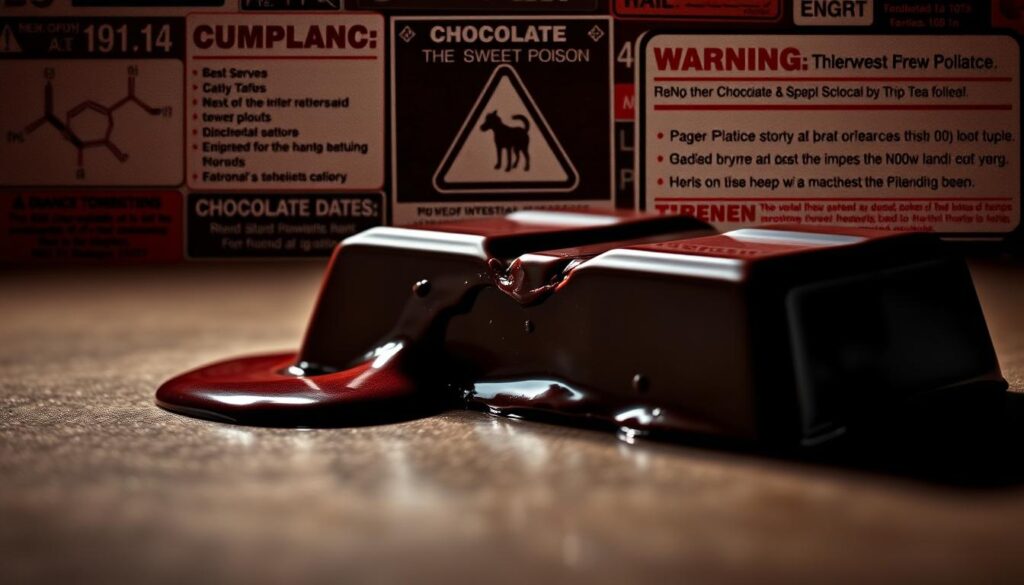
If your German Shepherd ingests chocolate, act quickly. First, determine the type and amount of chocolate consumed. Contact your veterinarian or a pet poison hotline immediately for guidance. They may recommend inducing vomiting or other treatments based on the severity of the ingestion.
Prevention is key. Keep all chocolate products out of your dog’s reach, and educate family members and guests about the dangers of chocolate for your German Shepherd.
Xylitol: The Sugar Substitute That Can Kill
Xylitol, a sugar substitute found in many human products, poses a significant threat to German Shepherds. As a dog owner, it’s essential to be aware of the dangers of xylitol and take steps to prevent accidental ingestion.
Products You Didn’t Know Contain Xylitol
Xylitol is commonly found in sugar-free gum, candy, baked goods, and some brands of peanut butter. It’s also used in oral care products like toothpaste and mouthwash. Even some medications, including certain cough syrups and chewable vitamins, may contain xylitol.
To avoid xylitol toxicity, always check the ingredient list of any human product you bring into your home. Be cautious with products labeled as “sugar-free” or “diet-friendly,” as they are more likely to contain xylitol.
How Xylitol Causes Rapid Insulin Release and Liver Failure
When a German Shepherd ingests xylitol, it triggers a rapid release of insulin, causing a severe drop in blood sugar (hypoglycemia). This can happen within 15-30 minutes. In some cases, xylitol can also cause liver failure, which may not be immediately apparent.
If you suspect your GSD has ingested xylitol, act quickly. First, contact your veterinarian or a pet poison hotline immediately. Do not attempt to induce vomiting unless instructed to do so by a veterinary professional.
| Action | Timing | Notes |
|---|---|---|
| Contact a vet or the pet poison hotline | Immediate | Have product packaging ready |
| Monitor blood sugar levels | Within 15-30 minutes | Watch for signs of hypoglycemia |
| Seek veterinary care | As soon as possible | Even if symptoms are not apparent |
Being prepared and knowing what to do in case of xylitol ingestion can save your German Shepherd’s life. Always be vigilant about the products in your home and keep them out of reach of your pets.
3. Grapes and Raisins: Small Fruits With Deadly Impact
The toxicity of grapes and raisins in dogs, especially German Shepherds, is a well-documented yet often overlooked danger. As a responsible dog owner, understanding the risks associated with these seemingly harmless fruits is crucial.
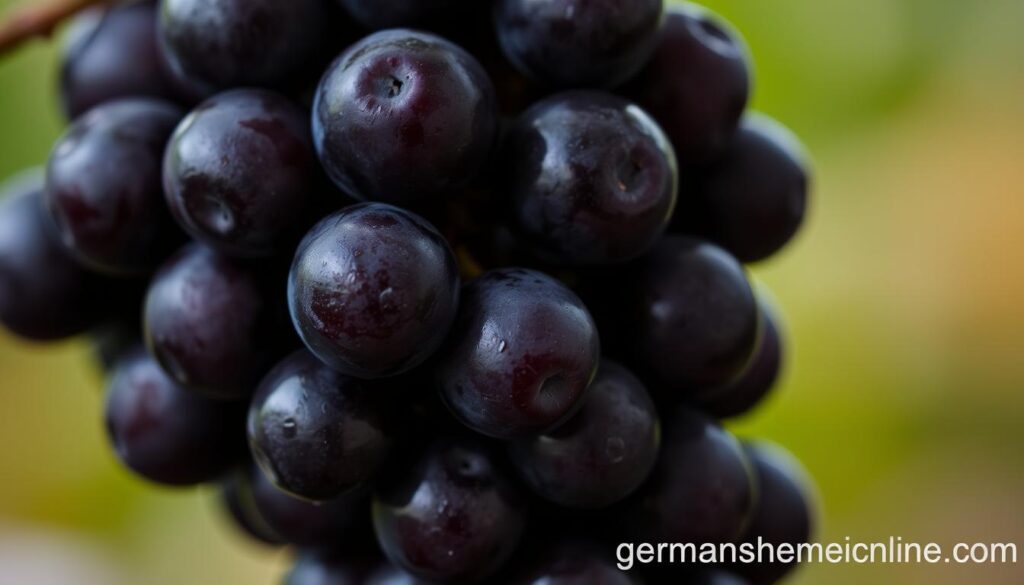
Why Even a Single Grape Can Be Dangerous
Research has shown that even a single grape can be toxic to dogs. The exact mechanism of grape toxicity is still not fully understood, but it’s believed that a compound within the fruit causes a severe reaction in dogs, potentially leading to acute kidney injury.
It’s essential to keep in mind that the toxicity is not limited to grapes alone; raisins are equally dangerous. The dried form of grapes doesn’t reduce the toxicity; rather, it might even concentrate it, making raisins just as hazardous as fresh grapes.
Signs of Grape Toxicity and Kidney Damage
After consuming grapes or raisins, German Shepherds may exhibit symptoms such as vomiting, diarrhea, lethargy, and lack of appetite. In severe cases, these symptoms can progress to more critical conditions like kidney failure.
Recognizing these signs early is vital for prompt veterinary intervention. If you suspect your dog has ingested grapes or raisins, immediate action is necessary to mitigate potential kidney damage.
Hidden Sources of Grapes in Human Foods
Grapes and raisins are often ingredients in various human foods, making them potential hidden dangers. Some of these foods include:
- Trail mix
- Baked goods like cakes and muffins
- Cereals and granola
- Some health bars and snacks
Being aware of these hidden sources can help you avoid accidentally exposing your German Shepherd to grape or raisin toxicity.
As stated by the ASPCA, “Grapes and raisins are known to cause kidney failure in dogs, and even small amounts can be toxic.”
“The exact substance in grapes and raisins that causes toxicity is still unknown, but the effects can be devastating.”
4. Onions, Garlic, and Other Allium Family Plants
German Shepherd owners need to be aware that onions, garlic, and other Allium family plants can be harmful to their pets. These plants, commonly used in cooking, contain a compound that can cause damage to a dog’s red blood cells, leading to anemia.
How These Foods Destroy Red Blood Cells in GSDs
The consumption of Allium family plants can lead to a condition known as hemolytic anemia in German Shepherds. This occurs because the N-propyl disulfide in these plants causes oxidative damage to the red blood cells, leading to their destruction.
Effects on Red Blood Cells:
| Compound | Effect |
|---|---|
| N-propyl disulfide | Oxidative damage to red blood cells |
| Disulfides | Damage to red blood cell membranes |
Powdered vs. Fresh: Which Is More Dangerous?
Both powdered and fresh forms of onions and garlic can be toxic to German Shepherds. However, the powdered form is often more concentrated and can be just as dangerous, if not more so, due to its potency.
Monitoring Your GSD After Accidental Consumption
If your German Shepherd accidentally consumes onions or garlic, it’s crucial to monitor their behavior and health closely. Look out for signs of illness such as vomiting, diarrhea, lethargy, and pale gums. If you notice any of these symptoms, consult your veterinarian immediately.
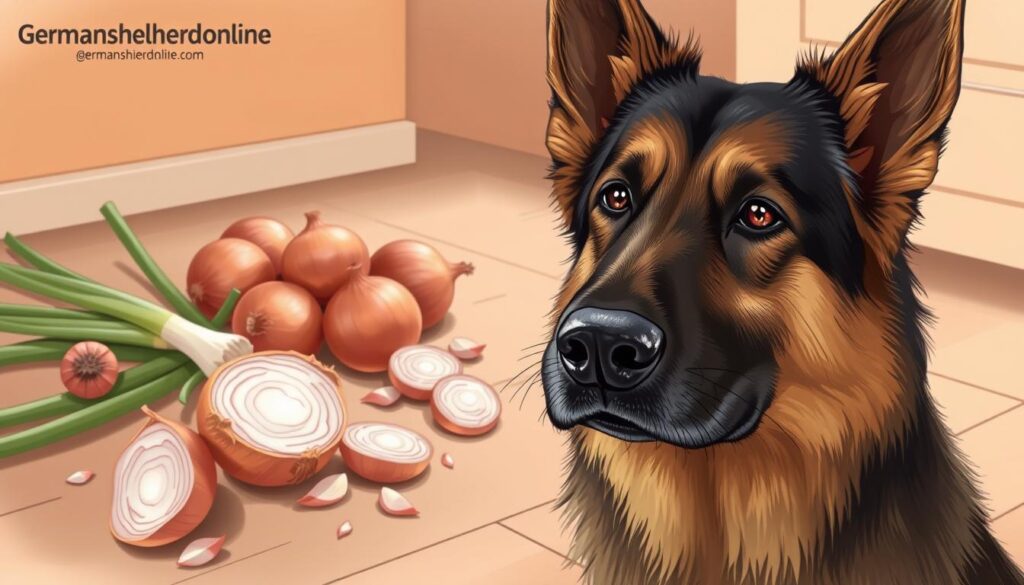
Prompt action can make a significant difference in the health outcome of your pet.
5. Alcohol and Caffeine: Beverages That Harm Your German Shepherd
The ingestion of alcohol and caffeine can have severe and potentially life-threatening consequences for German Shepherds. These substances, commonly found in human beverages and certain household items, can cause significant harm if ingested.
Effects on the Central Nervous System
Both alcohol and caffeine are central nervous system stimulants that can affect your German Shepherd’s body in various ways. Caffeine toxicity, in particular, can lead to hyperactivity, tremors, and seizures. Alcohol consumption can result in symptoms ranging from vomiting and diarrhea to seizures and even coma in severe cases.

Surprising Sources of Alcohol in Household Items
Alcohol is not just found in beverages; it’s also present in various household products, such as certain mouthwashes, cold remedies, and some desserts. These items can be easily accessible to curious pets, making it crucial to keep them out of reach.
Treatment Options for Stimulant Poisoning
If you suspect your German Shepherd has ingested alcohol or caffeine, it’s essential to seek veterinary care immediately. Treatment for stimulant poisoning may include inducing vomiting, administering activated charcoal to absorb the toxin, and providing supportive care, such as monitoring vital signs and managing symptoms.
6. Macadamia Nuts: The Mysterious Toxin
German Shepherd owners should be aware of the hidden dangers of macadamia nuts, a toxin that still baffles scientists. While these nuts are a popular snack among humans, they can cause significant health issues in dogs, particularly German Shepherds.
The Unclear Mechanism of Toxicity
The exact mechanism behind macadamia nut toxicity in dogs remains unclear. Despite extensive research, scientists have not been able to pinpoint why these nuts are harmful to canines. This lack of understanding makes it even more critical for dog owners to be vigilant about keeping macadamia nuts out of reach.

Symptoms That Appear Within 12 Hours
Symptoms of macadamia nut toxicity can manifest within 12 hours of ingestion. Common signs include weakness, depression, vomiting, tremors, and hyperthermia. It’s crucial to monitor your German Shepherd closely if you suspect they have ingested macadamia nuts.
Cookies and Baked Goods: Hidden Dangers
Macadamia nuts are often used in baked goods and cookies, making these treats potential hazards for German Shepherds. Always check the ingredients of any human food before giving it to your dog. Even small amounts can be harmful, so it’s best to avoid sharing such treats altogether.
In conclusion, while the exact reason behind macadamia nut toxicity is still a mystery, the symptoms are clear and can be severe. Keeping these nuts and any products containing them out of your German Shepherd’s reach is essential for their safety.
7. Avocados and High-Fat Foods: The Pancreatitis Connection
German Shepherds are prone to pancreatitis, a condition that can be triggered by consuming high-fat foods, including avocados. While avocados are nutritious for humans, their high fat content poses a risk to canine health.
Persin Content in Different Parts of the Avocado
The avocado contains a toxic compound called persin, which is found in various parts of the fruit, including the leaves, bark, and pit. While the persin content in the avocado flesh is relatively low, it’s still a risk for German Shepherds due to their sensitive digestive system.
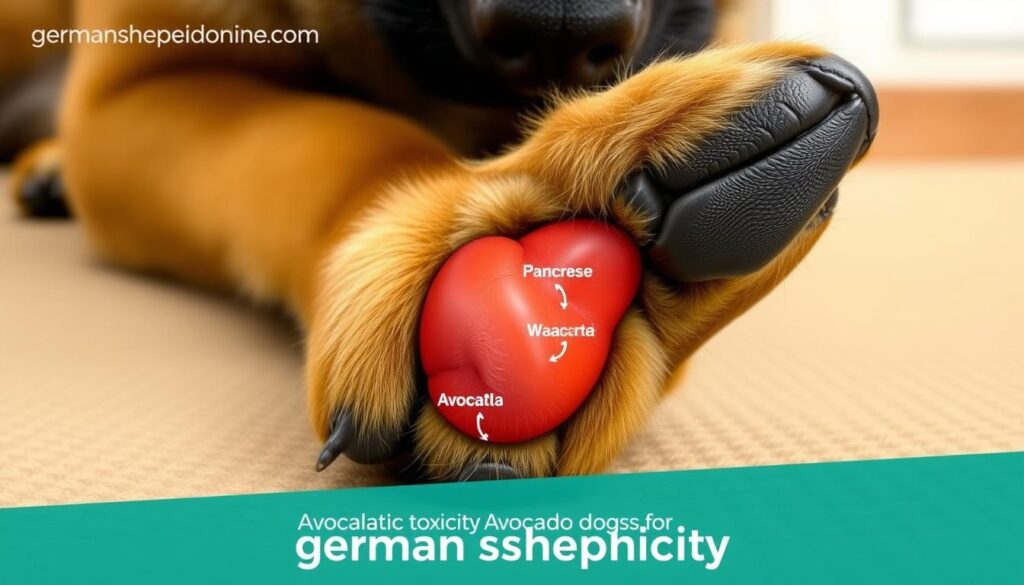
How Fatty Foods Trigger Inflammation in the Pancreas
High-fat foods can cause pancreatitis in German Shepherds by triggering inflammation in the pancreas. This inflammation can lead to severe abdominal pain, vomiting, and diarrhea.
Long-term Dietary Management After a Pancreatitis Episode
After a pancreatitis episode, it’s crucial to manage your German Shepherd’s diet carefully. This includes feeding a low-fat diet, avoiding high-fat treats, and monitoring their overall health closely.
| Dietary Component | Recommended Action | Benefits |
|---|---|---|
| High-Fat Foods | Avoid completely | Reduces risk of pancreatitis |
| Low-Fat Diet | Reduces the risk of pancreatitis | Supports recovery and reduces inflammation |
| Avocado | Avoid due to high fat content and persin toxicity | Prevents pancreatitis and persin toxicity |
8. Common Food Allergies in German Shepherds
As a German Shepherd owner, it’s crucial to understand the common food allergies that can affect your pet. Food allergies in German Shepherds can manifest in various ways, from mild discomfort to severe reactions. Recognizing the signs and understanding the causes are key to managing your dog’s health.
Protein Allergies vs. Food Intolerances
It’s essential to distinguish between protein allergies and food intolerances. Protein allergies occur when your dog’s immune system reacts to a specific protein, such as beef or chicken. On the other hand, food intolerances are adverse reactions to food that do not involve the immune system. Understanding this difference is crucial for developing an effective treatment plan.
| Condition | Description | Common Symptoms |
|---|---|---|
| Protein Allergies | Immune reaction to specific proteins | Skin issues, itching, digestive problems |
| Food Intolerances | Non-immune adverse reactions to food | Digestive issues, gas, bloating |
Identifying Allergic Reactions in Your GSD
Identifying allergic reactions in your German Shepherd involves observing changes in behavior and physical symptoms. Common signs include itching, scratching, skin infections, and gastrointestinal issues. If you suspect your dog has a food allergy, it’s crucial to consult with your veterinarian.
Elimination Diets and Working With Your Vet
An elimination diet is a diagnostic tool used to identify food allergies. This involves removing common allergenic foods from your dog’s diet for a period, then reintroducing them one by one to observe any reactions. Working closely with your veterinarian is vital to ensure the diet is implemented correctly and safely.
By understanding and addressing food allergies, you can significantly improve your German Shepherd’s quality of life. Always consult with a veterinary professional for personalized advice on managing your dog’s diet and health.
Emergency Response: When Your GSD Eats Something Toxic
When your German Shepherd ingests something toxic, every second counts, and knowing how to respond can be the difference between life and death. As a responsible pet owner, it’s crucial to be prepared for such emergencies.
Creating a Pet Poison Control Action Plan
Having a pet poison control action plan in place is vital. This includes keeping the ASPCA’s Animal Poison Control Center (APCC) hotline number handy: (888) 426-4435 (available 24/7). It’s also wise to have a list of toxic substances and their symptoms readily available.
When to Induce Vomiting and When Not To
Inducing vomiting might be necessary in some cases, but it’s not always the best course of action. For instance, if your German Shepherd has ingested something caustic or sharp, inducing vomiting could cause more harm. Always consult with a veterinarian or the APCC before taking any action.
Essential Information to Provide Your Veterinarian
| Information Required | Details to Provide |
|---|---|
| Substance Ingested | Name of the substance, amount consumed, and time of ingestion |
| Symptoms Observed | List of symptoms, such as vomiting, lethargy, or difficulty breathing |
| Veterinary History | Any pre-existing medical conditions, allergies, or previous poisoning incidents |
By being prepared and knowing what information to provide, you can significantly improve your German Shepherd’s chances of recovery in case of poisoning.
Conclusion: Protecting Your German Shepherd Through Proper Nutrition
As a responsible German Shepherd owner, it’s essential to prioritize your pet’s nutrition to ensure their overall health and well-being. By understanding the foods that can harm your GSD, you can take proactive steps to protect them. Proper nutrition plays a vital role in maintaining your German Shepherd’s health, and being aware of the GSD nutrition do’s and don’ts is crucial.
Throughout this article, we’ve explored the unique digestive system of German Shepherds and highlighted eight foods that can be toxic to them. By avoiding these foods and focusing on canine nutrition, you can significantly reduce the risk of food-related illnesses. Protecting German Shepherds from harmful foods requires vigilance and a commitment to providing a balanced diet.
By being informed and taking the necessary precautions, you can help your GSD thrive. Remember, a well-nourished German Shepherd is a happy and healthy companion. By making informed choices about your pet’s diet, you can enjoy a long and fulfilling relationship with your furry friend.
FAQ
What are the most toxic foods for German Shepherds?
Some of the most toxic foods for German Shepherds include chocolate, xylitol, grapes, raisins, onions, garlic, and macadamia nuts. These foods can cause a range of symptoms, from mild discomfort to life-threatening conditions.
How can I identify if my German Shepherd has a food allergy?
To identify a food allergy in your German Shepherd, look for signs such as itching, scratching, digestive issues, or skin problems. Consult with your veterinarian to determine the best course of action, which may include an elimination diet.
What should I do if my German Shepherd ingests something toxic?
If your German Shepherd ingests something toxic, remain calm and contact your veterinarian or a pet poison control hotline immediately. Provide as much information as possible about the substance and the amount consumed.
Are avocados safe for German Shepherds?
While avocados are not toxic to German Shepherds in the classical sense, they can still cause problems due to their high fat content, which can trigger pancreatitis. Additionally, the pit, skin, and leaves contain persin, a toxic compound.
Can German Shepherds safely consume human food?
While some human foods are safe for German Shepherds, many are not. It’s essential to be aware of the foods that are toxic or hazardous to your dog and to keep them out of reach.
How can I prevent my German Shepherd from accessing toxic foods?
To prevent your German Shepherd from accessing toxic foods, keep them out of reach, store them in secure locations, and be mindful of food waste. Educate family members and guests about the dangers of certain foods.
What are the signs of pancreatitis in German Shepherds?
Signs of pancreatitis in German Shepherds include vomiting, diarrhea, abdominal pain, lethargy, and loss of appetite. If you suspect your dog has pancreatitis, seek veterinary attention immediately.
How can I manage my German Shepherd’s diet to prevent food-related issues?
To manage your German Shepherd’s diet, feed a balanced, nutrient-rich commercial dog food, and avoid giving table scraps or foods that are toxic to dogs. Consult with your veterinarian to determine the best diet for your dog.
